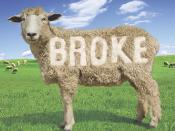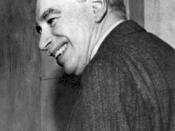President Franklin Delano Roosevelt of the United States faced a dilemma. The American economy was in shambles. As the president, Roosevelt had to solve the problems and he relied on one man's theories to pull him through. John Maynard Keynes was an important British economist during the twentieth century. His theories had a major impact on FDR's perspective on the American government's economy. In 1933, the United States, quite out of keeping with its constitution, embraced Keynesian economics with the announcement of the 'New Deal.' The New Deal programs were created to combat the Great Depression. The following essay will discuss Keynes' theories regarding coping with a recession and how the government should be involved. Upon acknowledging these theories and studying some of the New Deal programs, it becomes obvious that Keynes economically influenced FDR. Lastly, this essay will analyze the New Deal's success.
Keynes made several theories regarding how a government should get involved during a country's recession.
The two most important ones are; the supply and demand theory, and the deficit spending. Keynesian economics is defined as the "use of government spending to encourage economic activity by increasing demand for goods." Keynes was opposed to the ideas that supply generated demand. He demonstrated that "supply often exceeded demand, therefore leading to unemployment, idle resources, social conflicts, and needless waste of human potential" (Kuttner: 1991, 26). This was close to reality. During the Great Depression, many factories were out of business. Products were not being produced, and nearly one out of every four Americans was unemployed. Men who could have been spending their time working, or doing something productive, now spent their time waiting outside soup kitchens. It was true to say that during the depression, human potential was wasted. In Keynes' Collect Writings (1989), he wrote that "if...


